- Home
- Andrew McGahan
Last Drinks Page 12
Last Drinks Read online
Page 12
Maybellene, however, was something special.
She was brilliant and she hated him. He stood for everything about Queensland politics that she loathed. She harassed him during his lectures. Asked him exactly the questions that no one else in the state dared. Admittedly he could brush them all aside—he had a lifetime’s experience beyond hers—but he was intrigued just the same. There was something about her. Something vulnerable behind all that intelligence and anger. Something lost. Something, Jeremy decided, that called out for guidance. His particular guidance.
Maybe it was Catholicism serving as a link. Later, Jeremy would tell me she reminded him of a wayward novitiate, using all her faith and passion to fight against her vocation rather than with it. And it was true that May was the sort of student who, in an earlier age, might have been drawn, in some troubled way, towards a nunnery. In that same earlier age, Jeremy himself might have been a bishop. A worldly bishop. Layered in red, unctuous and unholy, and an exploiter, a manipulator, of men’s souls.
So it was that in the aftermath of the great electricity dispute, with Marvin triumphant, with the union routed and all their allies scattered, with Maybellene disgraced and in prison, so it was that Jeremy arrived in her cell, to tempt her in the wilderness.
His timing was perfect. May was suffering a crisis of belief. Her cause had collapsed, riddled with division and faint hearts. Her comrades had betrayed her, were less than her, were despicable. Her studies were in tatters. The university wanted nothing more to do with her. And looming ahead, at the behest of an all-powerful government she had no hope of defeating, lay jail time.
Jeremy saw all this, and knew what blandishments to whisper. He was an old man, he told her, he’d seen how the world worked. Some things would always be, and it was worse than futile to battle against human nature. Queensland itself was an example of human nature. Greed and selfishness and stupidity . . . it was all there. The thing was to understand it, to mould it, not fight against it blindly. He could show her the real way of things, he said. The side of suggestion and influence, where friends would not desert her. Where there was no weakness or doubt. Where there was a use for her brilliance, not a grave for it. Come and work with me, he said. If Queensland must be a state of mindless voters and fools, then what was the point in trying to save them all? They weren’t worth it, they never would be. Come and work with me instead, and see what it’s like to make what you want to happen actually happen.
And as a token of good will, with a wave of his hand, Jeremy showed her just a glimpse of what powerful friends could do for her. He set her free. All charges dropped.
In a dream May walked out of prison that same day. Her soul was in turmoil. For a week she struggled with herself. She went to one last union meeting and witnessed only anger and recriminations and division, all of it useless. She read newspapers singing Marvin’s praises. She listened to people on buses, thanking heaven that the power was back on, and to hell with unions. And with that she gave up on Queensland. She took the job, and moved into Jeremy’s house as his personal assistant.
All of which passed without public comment.
And none of which I knew at the time.
My first real meeting with Sir Jeremy did not take place until our new club was ready to open. The club was in the Valley, one street across from Brunswick. The syndicate, plus a few close friends, had gathered to inspect the premises one last time, and to have a few drinks before the first official patrons arrived. I was wandering around on my own. Downstairs there was a long bar, tables and chairs for dining, a dance floor and a stage—for bands, for girls, whatever we wanted. This was where we’d spent the money. On carpeting, on furnishing and on lights. It was the public face of the club. But it wasn’t where we expected to make the money.
That was upstairs, in the casino. Not that it really looked like a casino, not in the sense of glittering lights and plush surroundings. There were roulette tables, and blackjack tables, and a few gaming machines flown in from the south, but it didn’t seem quite real. The furniture was cheap, the windows were darkened, lighting was basic, there was no decoration on the walls, and there didn’t seem to be room for more than ten or twenty people. The bar was serious, though. Fully stocked, and drinks were free, of course, to all players. And once it was filled with people and noise and smoke, it would be a casino, sure enough. But that first night it felt like a private room under someone’s house. It felt like a toy.
I went back downstairs. Marvin brought Jeremy over to me, and formal introductions were made. I knew a little more about him now, and was more aware of the air that surrounded him. Aristocracy, a studied, polished mastery. Tall and gaunt and venerable, he made an interesting contrast to Marvin—all brash and loud and utterly graceless. I was puzzled, even in that first moment, about what the two might have in common. Or why, indeed, Jeremy was getting involved with any of us. He was almost three times my age.
‘I read all your columns, George,’ he said.
‘Thanks.’
‘Of course, you don’t know nearly half of what really goes on in this town.’
‘No? And you do?’
He smiled, and there was a glint of something not at all aristocratic in his eyes. ‘Oh, yes.’
I liked him.
They moved off, and I headed for the bar, nodding at people. The crowd was building, but I knew everyone, it was only close friends and insiders in attendance. The door to the casino was wide open. Later on there would be a doorman and a stricter security policy. True, the police and all the relevant authorities had been paid and notified, but even so, there were protocols to observe. The high life wasn’t available to just anyone.
I leant on the bar and stared about, nursing my drink. I had some friends of my own arriving a little later, and for the time being I was content just to watch the others. Lindsay was roaming about looking serious. This was really his night, for all that Charlie’s name was over the door. Charlie himself was entertaining a group of familiar faces at one end of a table laden with complimentary wine and champagne. Laughter rolled across from him. Marvin was still leading Jeremy around the room, continuing the introductions. Music played softly . . . but later it would be much louder, I would be drunker and, upstairs, cash would start flowing over the tables. I sipped my drink, satisfied. The night was assured and it all felt as it should.
Movement caught my eye and I glanced at the stairs that led to the casino. A woman was coming down, a woman I’d never seen before. She was young, and frowning to herself, severe. I studied her in surprise. It wasn’t just that she was a stranger and yet was obviously exploring the place as if fully invited, it was that she didn’t look like anyone else in the room. The other women—the wives, the investors, the staff— tended towards the glamorous. There was a lot of gold and white and waves of blond hair. Tanned skin. Rings on fingers. This woman wasn’t anything like that. She was pale, wearing a straight black dress and flat black shoes, and there was no jewellery. Her hair was short and dark, lightly curled above a round face free of make-up. And she looked utterly unfriendly.
I watched as she stared around the room, not noticing me. She hesitated, then went to the champagne table, the far end from Charlie and his friends. She stood there alone for a moment. Did she even know anyone here? She studied all the wine and glasses. Her arms were crossed and her fingers drummed against her side. Then abruptly she reached out and picked up a bottle of champagne. It wasn’t open. She unwrapped the foil and examined the cork. There was a certain bafflement coming from her, as if champagne was an unknown thing.
Frowning again, she untangled the wires around the cork, and then started tugging at the cork itself. It didn’t move. She glanced around the room, tugged at the cork again. I was on the verge of pushing myself away from the bar and going over when Charlie loomed suddenly at her side. She reared back, startled by the look of him. But Charlie smiled his smile, said something I couldn’t hear, and she relaxed. She offered him the bottle. He shook his h
ead and instructed her instead, showed her how to hold the cork and twist the base of the bottle until the cork started to give. Then she jammed her thumbs under it, pushed, and with a pop the cork sailed across the room. She laughed, and her entire appearance changed. Charlie laughed. Champagne bubbled up, and they both reached for the glasses.
I shoved away from the bar, went over to where Marvin and Jeremy were finally sitting down at a table.
‘Any idea who that is with Charlie?’ I asked Marvin.
Marvin glanced over and shrugged. It was Jeremy who nodded. ‘She’s with me,’ he said. ‘My personal assistant. Her name’s Maybellene. Though I think she prefers May.’
Marvin considered her again, interested this time. ‘Ah . . . so she’s the one. Hope she was worth all the trouble.’
‘Oh, she is.’
Marvin guffawed. ‘I’ll bet.’
Jeremy shook his head gravely. ‘It’s not like that at all. This is purely platonic.’
‘Why? What’s so special about her?’
The old man thought, watching her. I watched as well. She wasn’t laughing any more. She was sipping on the champagne, listening to Charlie, and a wariness had clouded her face again. A resistance. Even to Charlie.
Jeremy sighed. ‘I don’t really know, but there’s something in that girl. If she could just get over those scruples of hers. Would you believe she was almost a teetotaller when she came to me. I’ve only just got her started on red wine. I think there’s a drinker in there somewhere. Drinking should help.’ He looked back to us. ‘Speaking of which . . .’
‘Shit, of course,’ said Marvin, sitting up. There was a freshly opened bottle of red wine on the table, and Marvin took it up and poured three glasses. Marvin and I drank immediately, but Jeremy merely sat for a time, silent, and studied his glass. Finally he slid out a thin hand and lifted the wine. His eyes held an intensity as he did so, and I noticed the faintest of tremors in his fingers.
His gaze rose, caught mine watching his hand.
‘My apologies,’ he said, his voice dry. ‘But I’m an alcoholic, you understand.’
Then he raised the glass and drank. It was only a small sip, but something in his eyes seemed to die with it, and at the same time there was a minimal relaxing of his pose, a breath of . . . what was it? Abandon?
He looked at me again. ‘And it’s been some time.’
Marvin nodded. ‘That’s right, you’ve been away for a while, haven’t you? St Amand’s, was it? Supposed to be a great place.’
Jeremy nodded, considering his glass, still raised before his face. Then he gave a distant smile and looked at us. ‘Here’s to St Amand. Patron saint of the lost weekend.’
‘Hail to the detox ward,’ Marvin added, and clinked his glass with Jeremy’s.
And we all drank.
EIGHTEEN
I found myself back in the motel room in New Farm, unpacking for another night.
I had an extra briefcase with me now. Old, stuffed with papers.
And an urn full of ashes.
I set it on the coffee table and stared at it for a time. Outside, the afternoon was growing late, the sky fading orange with the haze. A briefcase and an urn. A man’s entire existence sat before me. All the houses and cars he’d owned, the fine furniture, the wine cellar and the restaurants and the clubs . . . all gone, and the remains no more than could be carried in one hand. Was it right that they had come to me, me of all people? Was it what he would have wanted? He had died on his way to find me, but what was he after?
What was so urgent after all these years?
I took out my wallet and dug through it until I found a card. The paper was crisp, with a name and number printed on it. I picked up the phone, dialled, and waited as it rang. I reached out and rested a finger on top of the urn.
‘Detective Kelly here,’ said a voice.
‘It’s George Verney.’
‘George . . . how are you?’
‘I’m fine. I cremated Charlie this morning.’
‘Damn—was that this morning? I meant to go.’
‘It was in the paper.’
‘So who showed up? Any old friends?’
‘No one.’
‘No one at all? We actually need to know this, George.’
I thought of a woman, outlined for a moment in a doorway. ‘Only some old alcoholics from his hostel, and one of his counsellors.’
‘Marvin wasn’t there, for instance? Or Maybellene?’
‘No.’
He sounded disappointed. ‘Loyal bunch, weren’t you.’
‘I was wondering if there was any news. On the investigation, I mean.’
‘Our inquiries are still ongoing.’
‘Am I still a suspect?’
‘We’re not ruling anyone out.’
But it sounded like a no.
I said, ‘After the service I went over to the Uniting Church hostel. They said they’d been talking to you.’
‘That’s right.’
‘And you know Charlie stayed in St Amand’s Hospital?’
‘We have that information.’
‘You’ve been up there? You talked to the doctors?’
‘Yes, we talked to them.’
‘So . . . did anything in particular happen to him while he was there?’
‘That’s stuff I can’t go into, George.’
‘I just want to know if it’s related to his death, that’s all.’
‘Sorry.’
‘Well, do you know who paid his way in there? Charlie was broke.’
‘We’re looking into that.’
‘But you must have an idea?’
He sighed. ‘I’ve said all I can say.’
‘You haven’t said anything.’
‘I think that’s the idea.’
We hung on the line, silent.
He said, ‘You gonna be in town a while, George?’
‘I don’t think so.’
‘And where are you exactly?’
I hung up.
Official channels. They had it under control. It was their business. Police business.
But my head was full of memories. And I was in Brisbane for one more night.
Lightly, not wanting to think about what I was doing, I flicked open the phone book. I turned it to the letter P, ran my finger down the names. There was no entry for him, but then his number had always been unlisted.
I took a breath. I got up and went through my luggage. It was there, tucked away at the bottom of the bag, under all my clothes.
A little black notebook.
I studied the cover. It had a brittle feel, delicate. It was an item I had kept with me for ten years, never really admitting to myself that I was doing so. But nor had I ever actually thrown it away, even after I’d thrown away everything else. And when I was packing for the return to Brisbane, I’d taken it out of its cupboard and stashed it in the bag without really admitting that to myself either. How could I admit it? It had only one purpose, that little book, and it was a life I’d sworn I’d never go back to. Not even for the sake of burying Charlie.
It was an address book and it was full of phone numbers and addresses—all the contacts I’d ever made in those far-off days before the Inquiry, dozens of them, from all walks of life. It was my old self in its most compact form. And now it was time to open it again.
I sat by the phone, carefully parted the covers, and stared at the pages. It was like time travel, looking directly ten years into the past, more than ten years. My handwriting seemed somehow bigger, old-fashioned, not mine at all. But everything was still there. Names and places and numbers. Offices. Restaurants. Bars. Page after page of it. It was as if I could even smell the beer again. The long heady rush that filled my days . . .
It wasn’t good. It was a minefield. Every name and location meant too much, or worse, meant nothing at all. How much did I remember and how much had I forgotten? I didn’t want to know.
And then, jammed between some pages at the end, was a si
ngle, terrible piece of paper. Scribbled on it was the name of the Royal Brisbane Hospital and the number of a room. There was no date on it, but I didn’t need a date. I would always know the date. The words were written on 2 December, 1989. The day I fled Brisbane. And I’d written them while on the phone to Maybellene, all her tears and horror coming at me through the line. The writing was in pencil. Jagged and hurried. I stared at it for some time, remembering only May’s voice. And the thing she was telling me.
I blinked. I stuffed the paper back between the pages. Instead I found the place where, long ago, I’d written down Sir Jeremy Phelan’s unlisted home number. Then I picked up the phone again, and dialled.
Would he be there?
He was in a wheelchair now, the detectives had told me.
They hadn’t told me where that wheelchair was.
Would he even be in Brisbane? The last I’d heard of Jeremy, he was in Sydney, and that was over a decade ago, during the Inquiry. He was smarter than the rest of us. Older and wiser. He decamped as soon as the Inquiry began, and remained in Sydney for the duration. And he survived it all unscathed, without charge or prosecution. Perhaps he always would have, even if he’d stayed in Queensland. He wasn’t like the rest us; he was establishment. Old Brisbane. Doubly a protected species. Certainly his name was mentioned in connection with our syndicate, but only remotely, and as far as I knew no attempt was ever made to extradite him out of New South Wales. Anyway, they already had Marvin and Charlie, two of the ringleaders, and the third, Lindsay, had disappeared from the country, so maybe enough was enough. Those of Jeremy’s senior years and stature could be forgiven, it seemed. As it always was, with the gentry.
I’d never heard of him since. In truth he could be anywhere. Still in Sydney, or another city, or locked away in a nursing home somewhere. He’d be over eighty now, and his lifestyle had hardly earned him a healthy old age. On the other hand, his house in Brisbane had always been the ancestral home, and I doubted he would simply have sold it. So perhaps whoever lived there now might know where he was.

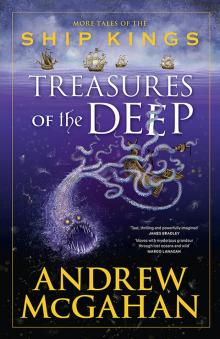 Treasures of the Deep
Treasures of the Deep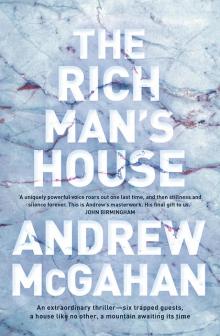 The Rich Man’s House
The Rich Man’s House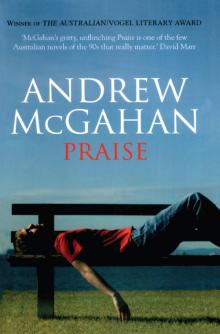 Praise
Praise The White Earth
The White Earth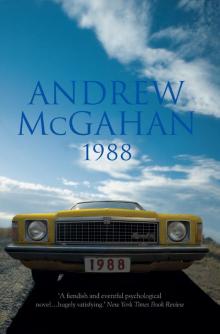 1988
1988 The Coming of the Whirlpool
The Coming of the Whirlpool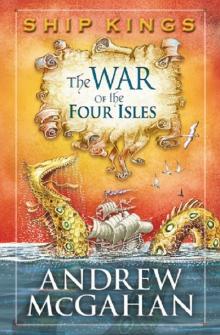 The War of the Four Isles
The War of the Four Isles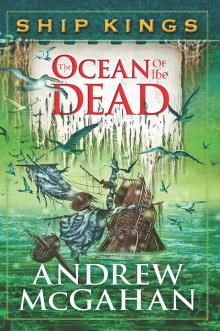 The Ocean of the Dead: Ship Kings 4
The Ocean of the Dead: Ship Kings 4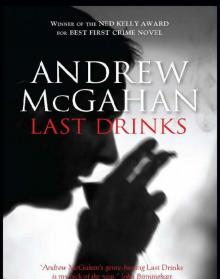 Last Drinks
Last Drinks Wonders of a Godless World
Wonders of a Godless World Underground
Underground The Voyage of the Unquiet Ice
The Voyage of the Unquiet Ice